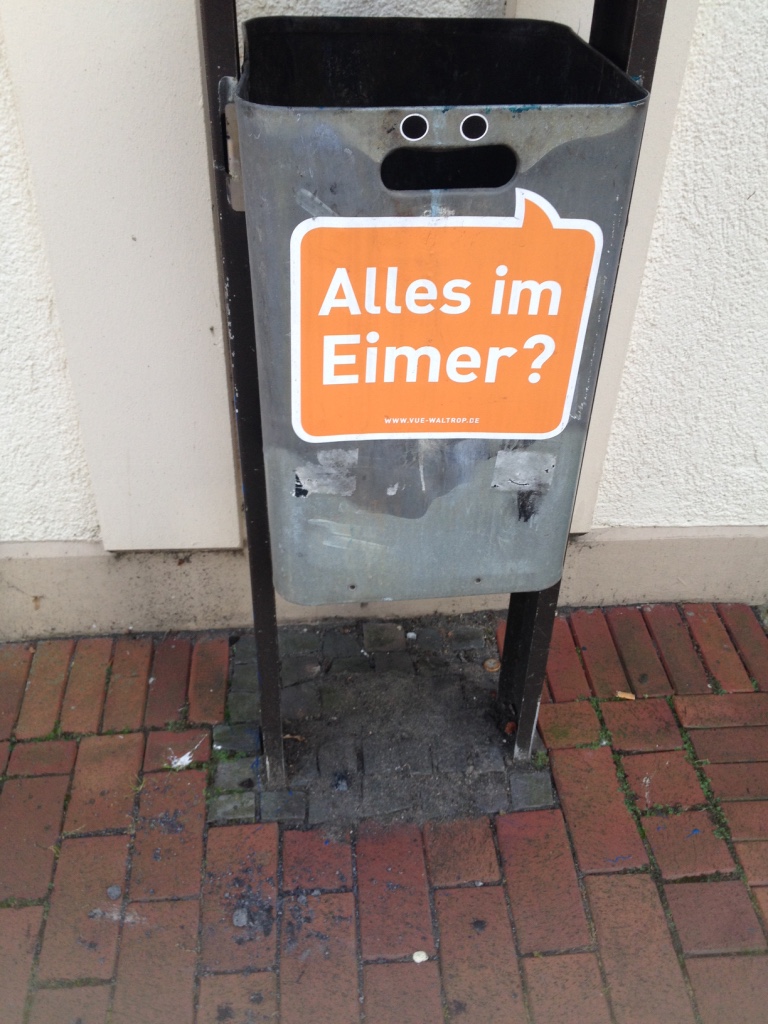11 Language Clues from German and Swiss Signs
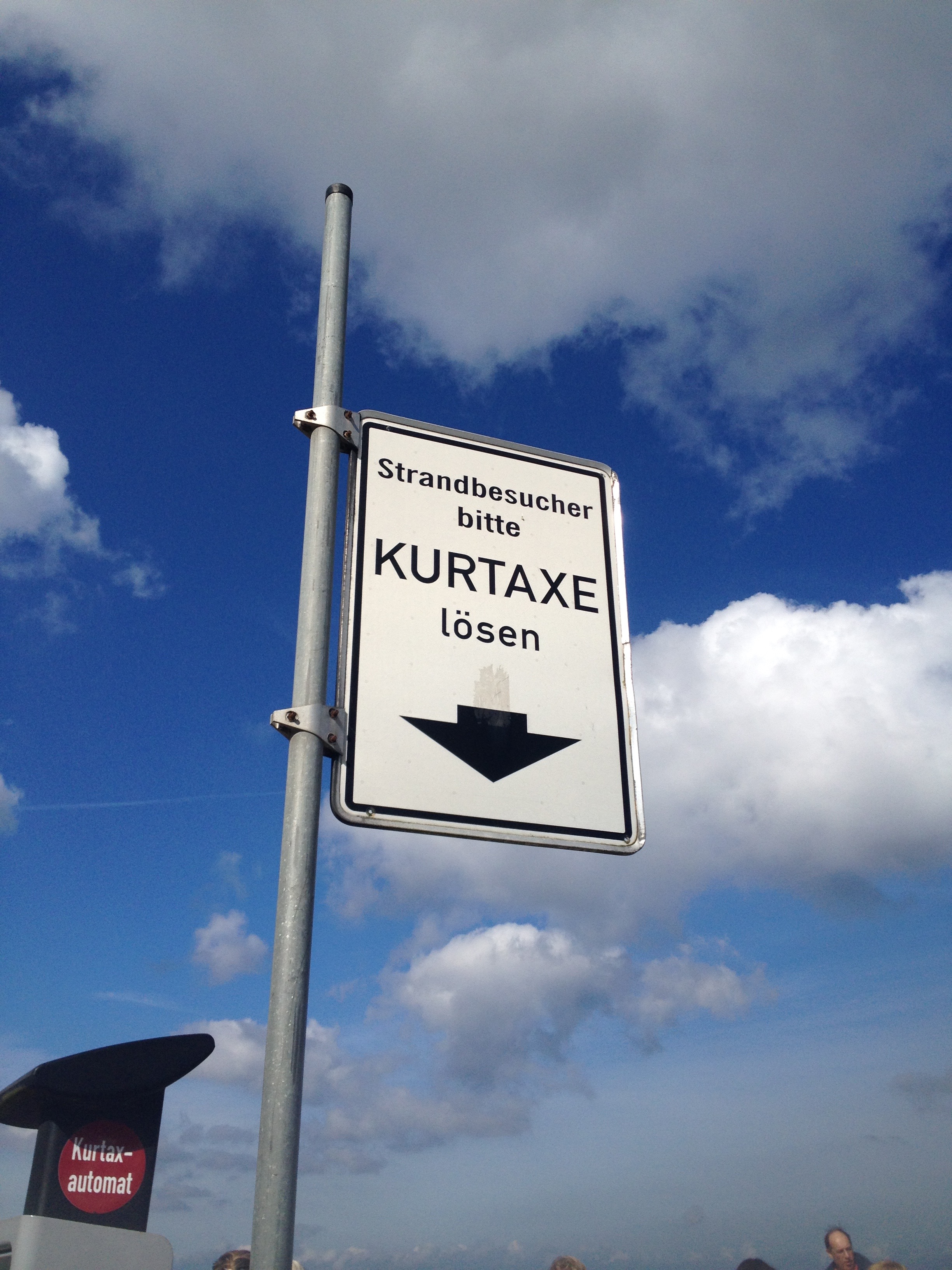 Deciphering the meaning of words and phrases from local signs and posters when visiting a foreign country is a fun and interesting way to add to your vocabulary. (See #8 for a translation of the sign on the left.)
Deciphering the meaning of words and phrases from local signs and posters when visiting a foreign country is a fun and interesting way to add to your vocabulary. (See #8 for a translation of the sign on the left.)
When you're there in the country, such signs and posters are in your face. They have a context that makes them memorable.
Official signs give instructions, warnings, or prohibit your actions in some way. Ad posters push a product, often using a play on words.
With these signs, you can learn various verbs and verb forms (especially the imperative with official signs).
You can also learn common expressions and forms of wordplay, especially from ad posters.
Besides being fun to read and muse about, such visual language provides great conversation starters with locals.
By simply asking what a word or phrase means, you could end up having an interesting discussion about linguistic and cultural differences.
We had a lot of fun looking for signs and other texts on our trip through northern Germany.
Our trip took us from Münster, Westfalia, to Cuxhaven on the North Sea, Hamburg, Lübeck, Wismar, Rostock, and Warnemünde on the Baltic Sea, the island of Rügen, then to Berlin, with a final hop to Switzerland. (Our trip started with 3 Languages, a Pyramid, Napoleon, Royalty and a Family Reunion)
Below is a sampling of signs and public texts that shows the wealth of visual language you can take in on a trip through a country. (See also 4 Easy Ways to Keep Learning in a Foreign City)
1. wie einfach mal Klartext reden.
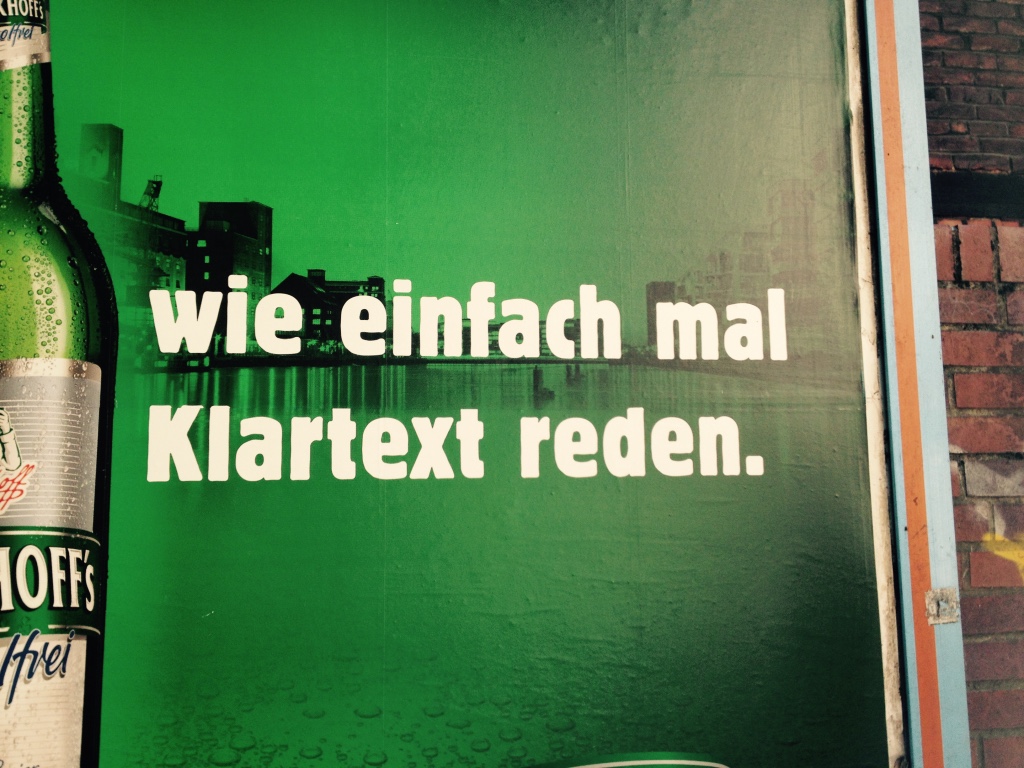 This is from an ad poster in Münster, Westfalen.
This is from an ad poster in Münster, Westfalen.
Translation: how to speak plainly with someone.
German: Klartext reden - offen seine Meinung sagen; nicht verschlüsselt reden (to speak in plain English; (coll.) to level with/talk turkey with somebody);
The phrase "einfach mal" is a conversational filler, meaning "just" or "simply."
I leave to it you to figure out what "Klartext reden" means in the context of this ad for Smirnoff's Vodka...
2. Alles im Eimer?
This sign on a public refuse bin in Münster, Westfalen, made us smile.
Translation: Everything in the bin?
German: im Eimer sein (umg.) - entzwei sein, verdorben sein (to be ruined; (coll.) to be up the spout)
The fun part about this is the play on words. "Eimer" means "bucket."
The German reference is to "Abfalleimer" which means "trashcan" or "garbage bin."
So the text "Alles im Eimer" literally asks you if you've put "everything into the trashcan" rather than throwing it on the street.
3. "Die Alte Liebe"...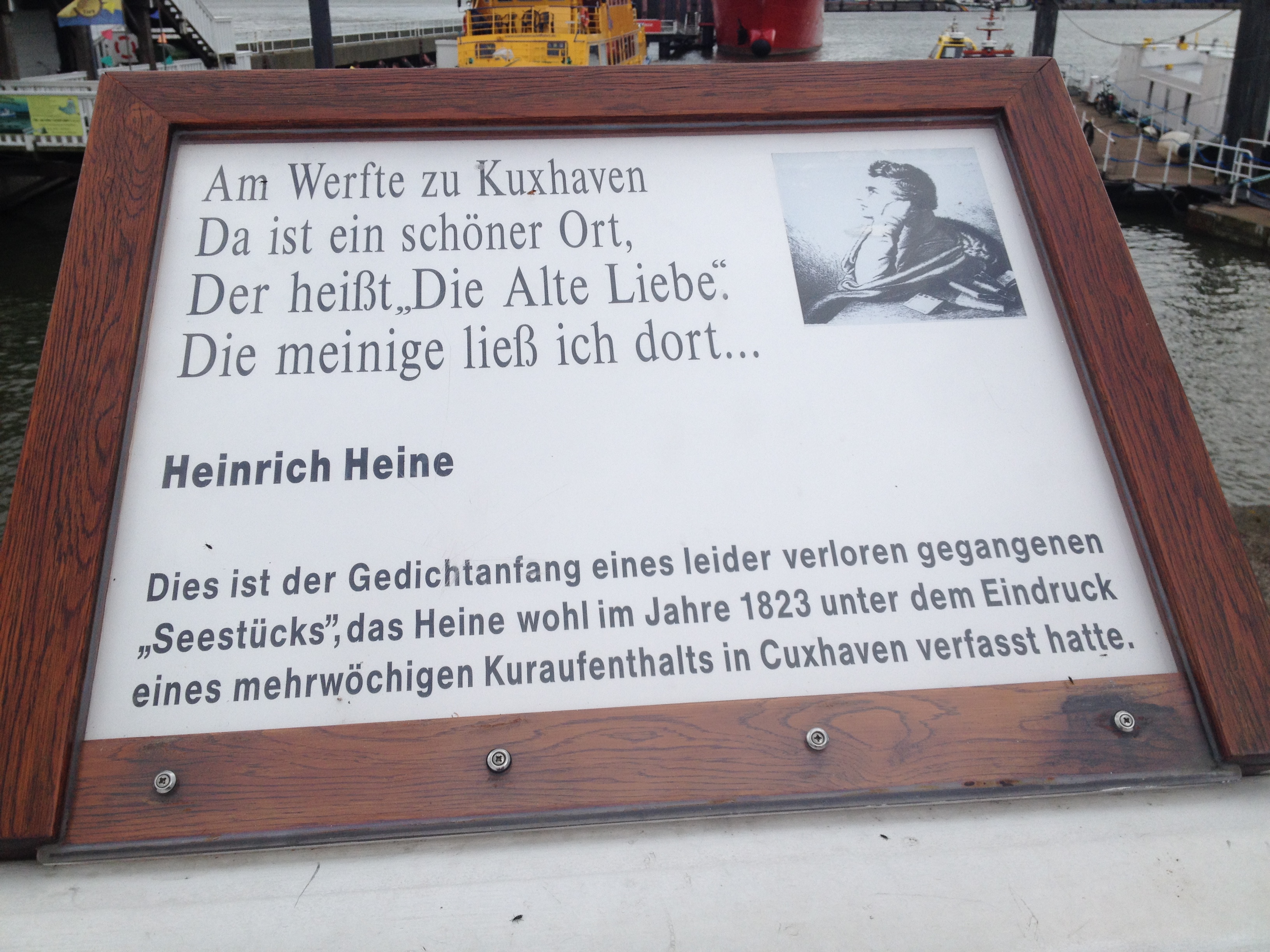
We saw this board at "Die Alte Liebe," a famous jetty with an observation and docking platform in Cuxhaven, a town at the southern shore of the Elbe river where it enters the North Sea.
Translation of the poem on the board: At the dockyard in Kuxhaven, There is a beautiful spot, It's called "The Old Love(r)"; I left mine (my lover) there.
The fours lines are from a lost poem of 1823, by the poet Heinrich Heine (1797-1856), who may be best known for "Die Lorelei."
4. Durchfahrt gebührenpflichtig
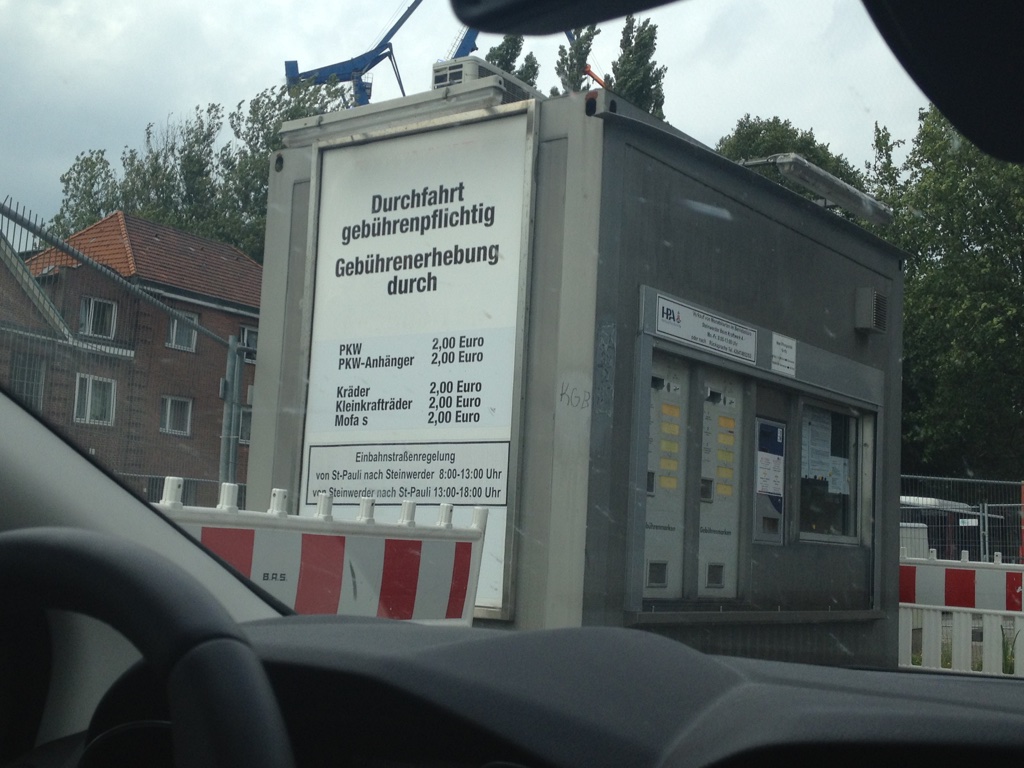 This sign marks the entrance to the old car elevator that takes you through the Old Elbe tunnel, in the Freie und Hansestadt Hamburg.
This sign marks the entrance to the old car elevator that takes you through the Old Elbe tunnel, in the Freie und Hansestadt Hamburg.
Translation: Passage is subject to charges
German: gebührenpflichtig, i.e. nicht kostenlos (subject to charges, not free of charges.) "Gebühren" are charges, "pflichtig" means "required," "necessary", derived from "Pflicht" or "duty."
During the drive into Hamburg our GPS took us to the end of a parking lot, with nowhere to go. But looking around, I saw this sign, which gave me the clue that something was up.
Indeed, it marked a ticket machine and the inconspicuous entrance to the old car elevator that took us into the city for 2 euros!
The tunnel and the four elevators to it were opened in 1911 and are still in operation.
5. Rote Grütze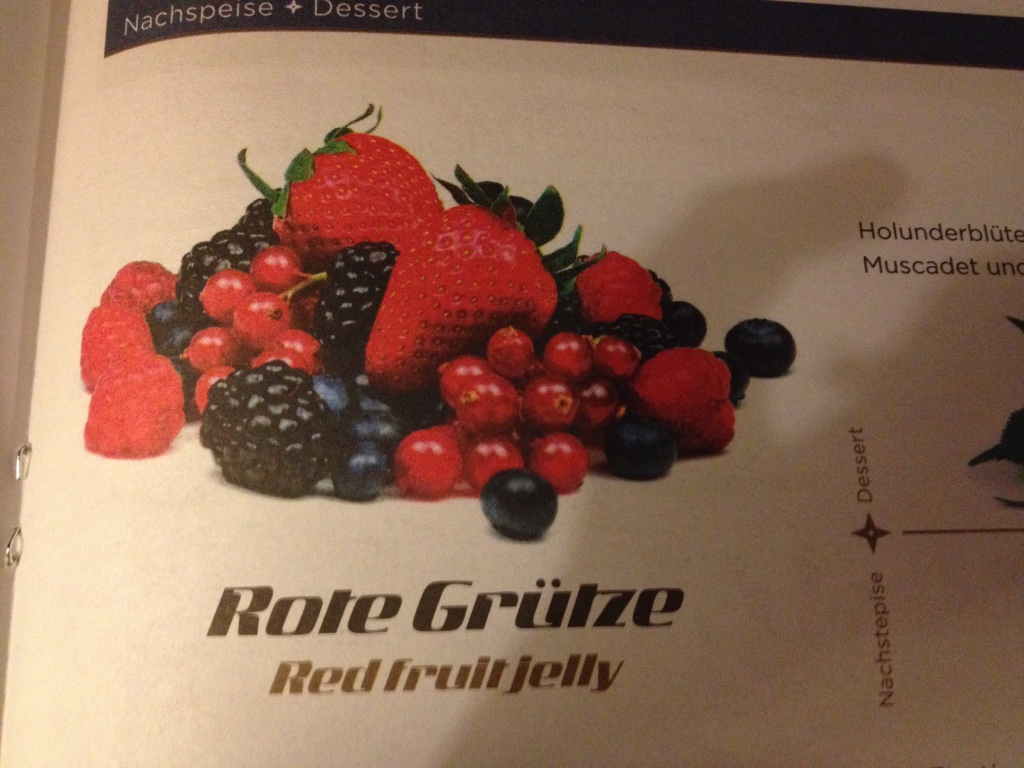
This is from the menu at the Restaurant "Schiffergesellschaft" in Lübeck, Schleswig-Holstein.
Translation: red grits/red fruit jelly (typical for northern Germany and Scandinavian countries)
German: Rote Grütze - eine Süßspeise aus Johannisbeeren, Himbeeren und anderen roten oder schwarzen Beeren, die mit Bindemittel aufgekocht werden.
(A dessert made from currants, raspberries and other red and black berries, which are heated with cornstarch to thicken the jelly.)
The word "Grütze," in fact means "grits, groats, porridge," but also has the figurative meaning of "grit, gumption, common sense, brains"; or in German: "Denkvermögen, Geist, Grips, Scharfsinn, Verstand."
6. Feinuhrenmacherwerkstatt
We saw this sign on a business vehicle in Boltenhagen, Mecklenburg-Vorpommern.
Translation: the workshop of a maker of high quality watches
German: Feinuhrenmacherwerkstatt - Reparatur und Restaurierung von antiken Uhren (a shop for repairing and restoring antique watches)
Germans have a knack for creating long compound nouns.
Starting at the end, you have "Werkstatt" (workshop, repair shop).
Next, you have "Macher" - maker, which here refers to someone who does repairs.
Next, "Uhren" - watches, and then, at the beginning comes the word "fein" - which means "fine" or "high quality."
So, this 24-letter word tells you that it's the repair shop for "Feinuhren" - high quality, antique watches.
7. Nosferatu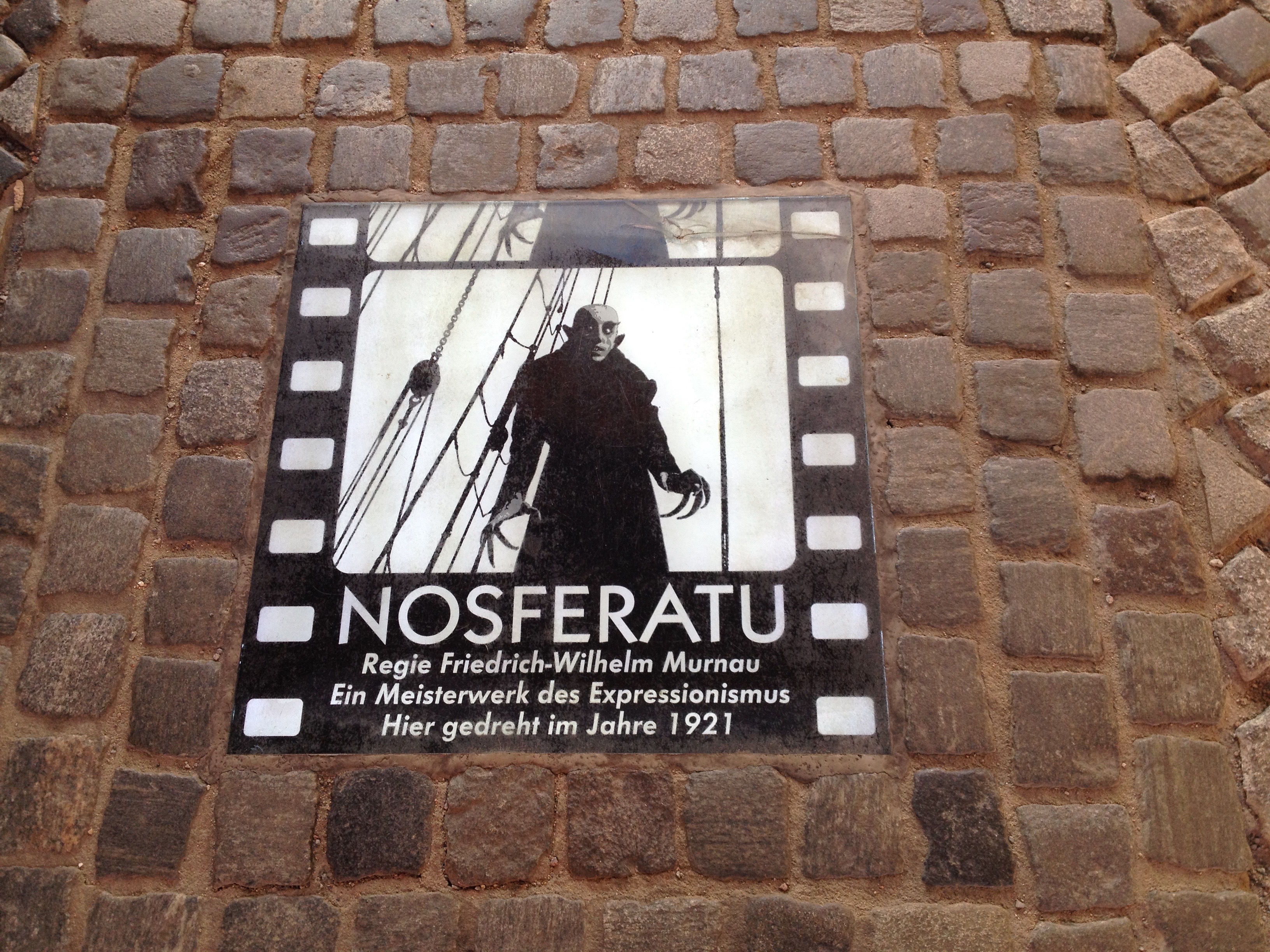
The information board at the Water Gate (Wassertor) in Wismar, Mecklenburg-Vorpommern reads:
Regie Friedrich-Wilhelm Murnau.
Ein Meisterwerk des Expressionismus.
Hier gedreht im Jahre 1921.
Translation: Nosferatu. Directed by Friedrich-Wilhelm Murnau. A masterpiece of Expressionism. Made here in 1921.
German expressions: Regie führen (to direct [a film]); einen Film drehen (to make a film).
Nosferatu, a German Expressionist Horror film, was in fact an unauthorized version of Bram Stoker's "Dracula." Stoker's heirs sued over the adaptation, and a court ruling ordered that all copies of the film be destroyed.
However, a few prints of Nosferatu survived, and the film came to be regarded as an influential masterpiece of cinema. [from Nosferatu, Wikipedia]
7.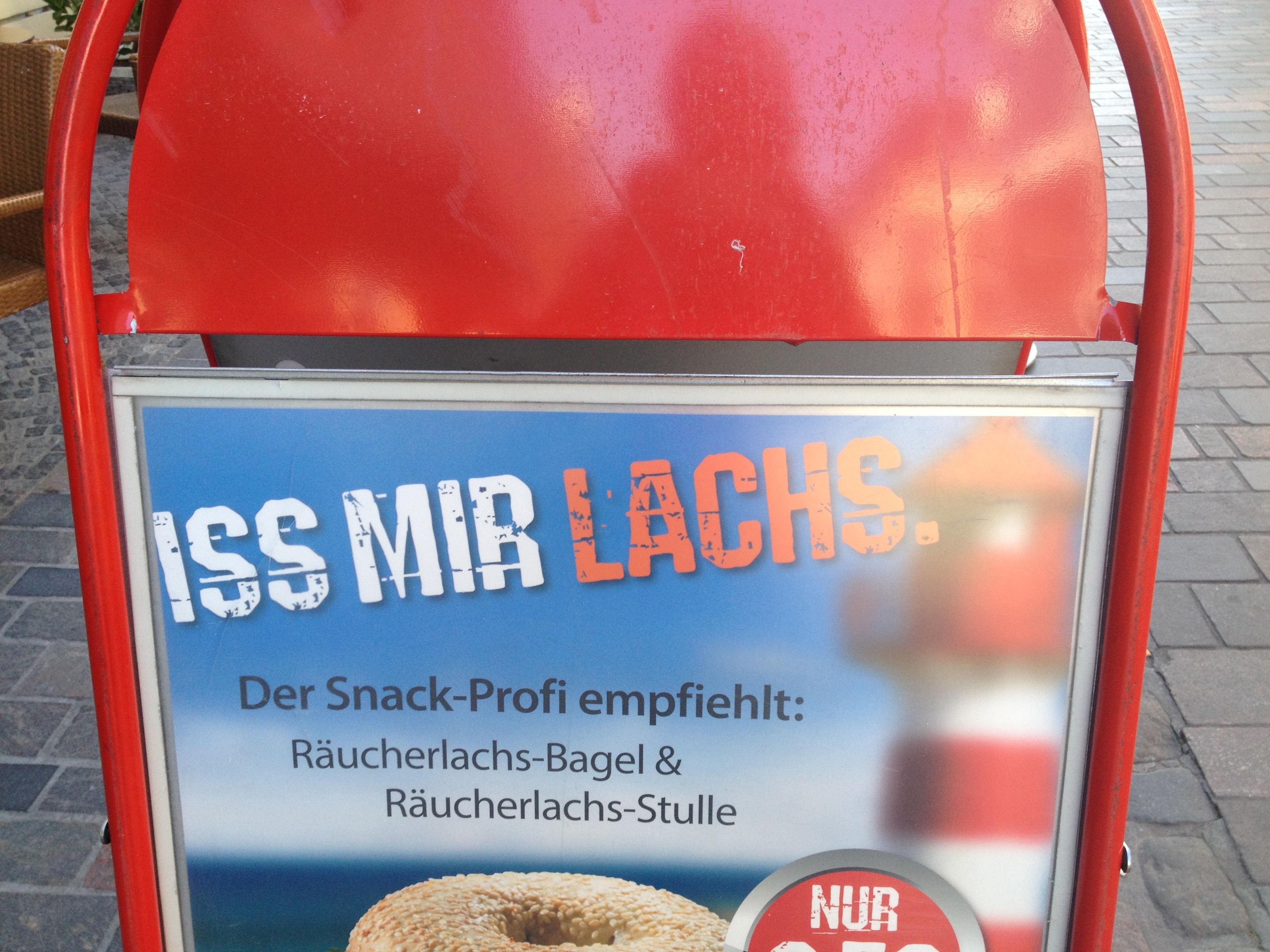 Iss mir Lachs
Iss mir Lachs
We saw this ad poster in Rostock, Mecklenburg-Vorpommern.
Translation: Do eat salmon.
German: der Lachs - salmon; "Iss!" is the familiar imperative form of "essen": eat!; "mir" can be used for emphasis: do eat. ("Räucherlachs" is smoked salmon.)
"Iss mir Lachs" is a wordplay on the expression "Is(t) mir Wurst," which means "It's all the same to me," literally "It's sausage to me." Here, the final "t" on "ist" is normally dropped, so the expression sounds like "Is mir Wurst."
However, the word "iss" is the familiar imperative form of "essen," and the word "mir" plays on the sound of "mehr" (more).
So, the ad-message is in fact a clever way of saying "Eat more salmon."
8. Strandbesucher bitte KURTAXE lösen
 Official sign at a ticket machine at the beach in Heiligendamm, Mecklenburg-Vorpommern.
Official sign at a ticket machine at the beach in Heiligendamm, Mecklenburg-Vorpommern.
Translation: Beach visitors please pay Spa Tax
This may be a surprise for visitors to a German beach resort area: You pay an extra three or four euros a day for the upkeep of the resort, an extra charge that's added to your hotel bill. Day visitors pay a couple of euros for access to a beach, etc.
9. Heute Probeliegen in der Kapitänskoje
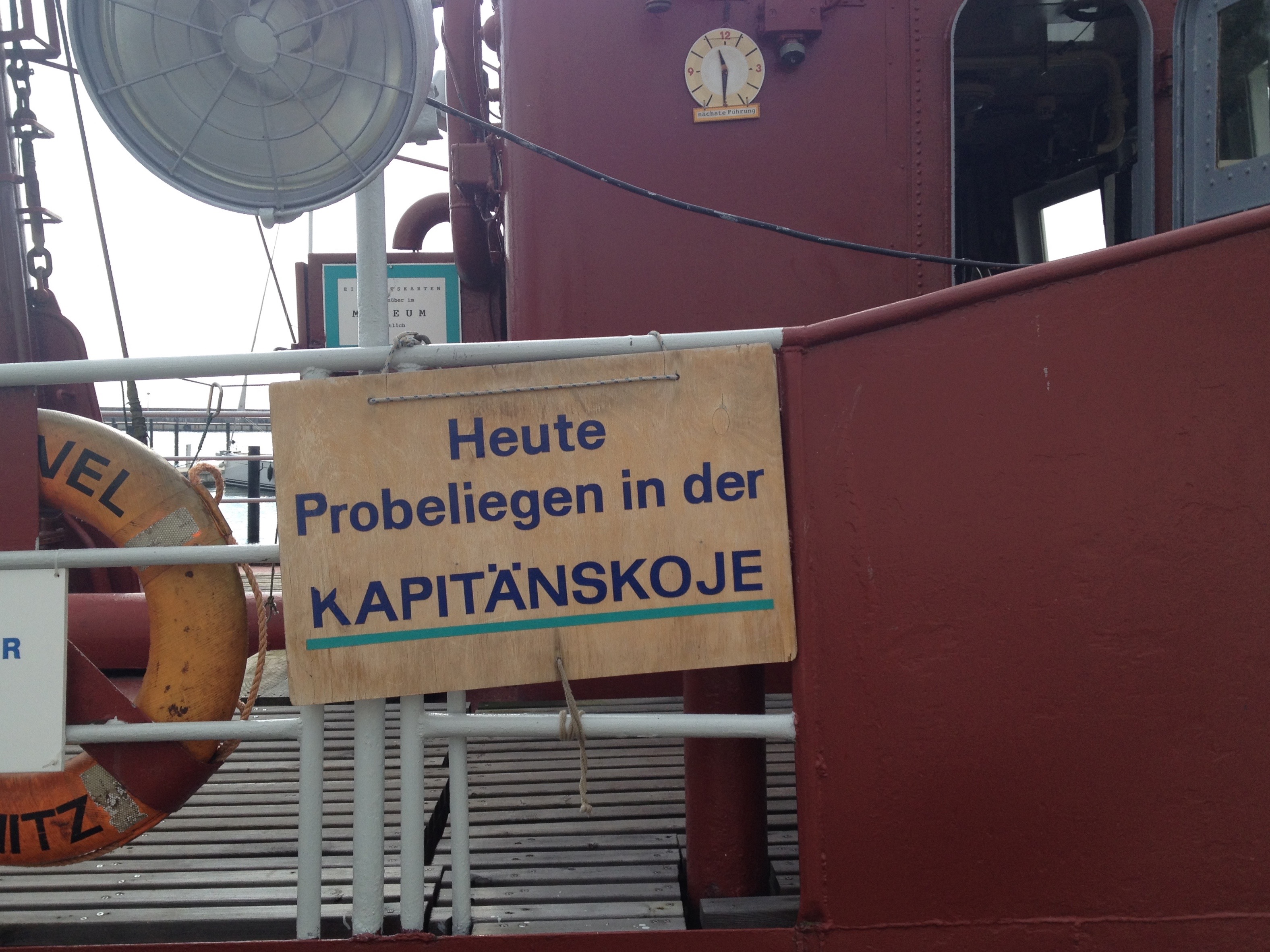 Information board at a ship in the harbor of Sassnitz on the island of Rügen, Mecklenburg-Vorpommern.
Information board at a ship in the harbor of Sassnitz on the island of Rügen, Mecklenburg-Vorpommern.
Translation: Today (you may) try out the the captain's bunk
German: die Probe - test, trial, rehearsal; liegen - to lie down; koje - bunk
No comment, as we wondered who would want to try the captain's bunk...
10. Gute Sitte in Mitte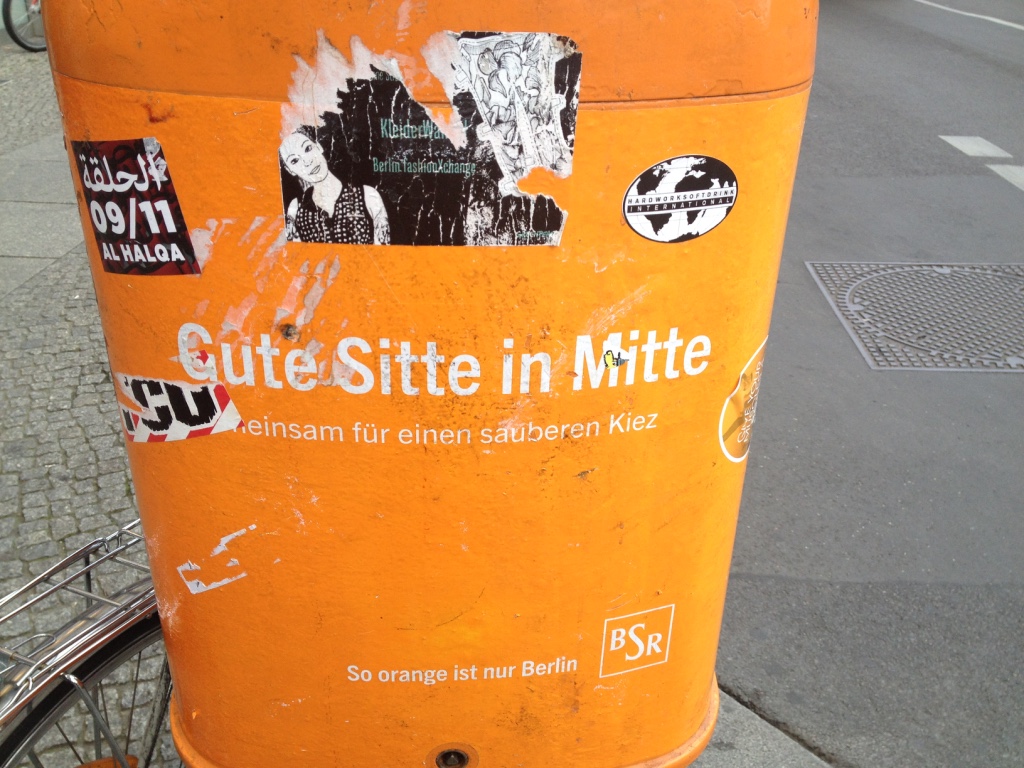
Germans try to live up to their reputation for orderliness by encouraging the use of public garbage bins with catchy slogans. We saw this one in the central district Mitte, Berlin.
Translation: Good behavior in (Berlin) Central
German: "die Sitte" - Benehmen, Manieren (customs, traditions, behavior)
As you can see, "Sitte" suggests more than just keeping trash off the streets.
"Mitte" - as the word implies - is the central, historical district of Berlin. Most of it used to be part of former East Berlin. Obviously, the German text is catchy because it rhymes, and the English translation does not do it justice.
And finally, a sign we always see, when we visit Fribourg, Switzerland:
11.Hüt! Freu di Hochzitter, du guete Ma,
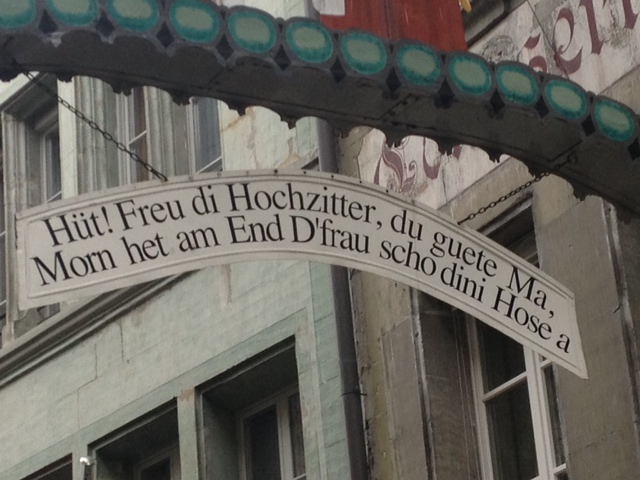 Morn het am End D'frau scho dini Hose a
Morn het am End D'frau scho dini Hose a
This sign hangs over the Rue des Épouses/Hochzeiterstraße in Fribourg/Freiburg, Switzerland.
Translation: Today! Be happy bridegroom, you good man, tomorrow your wife will wear the pants in the end.
Anybody learning German (and for that matter, even native Germans!) will certainly find it difficult to make sense of this Swiss German text with its abbreviations (“di”=dich; “Ma”=Mann; “Morn”=morgen; “D'Frau”= Deine Frau; “scho”=schon; “dini”=deine)
Swiss German translated to High German: "Heute! Freu dich Bräutigam (Hochzeiter), du guter Mann, morgen hat am Ende die Frau schon deine Hosen an."
As Fribourg is a bilingual town, the other side of the sign is in French:
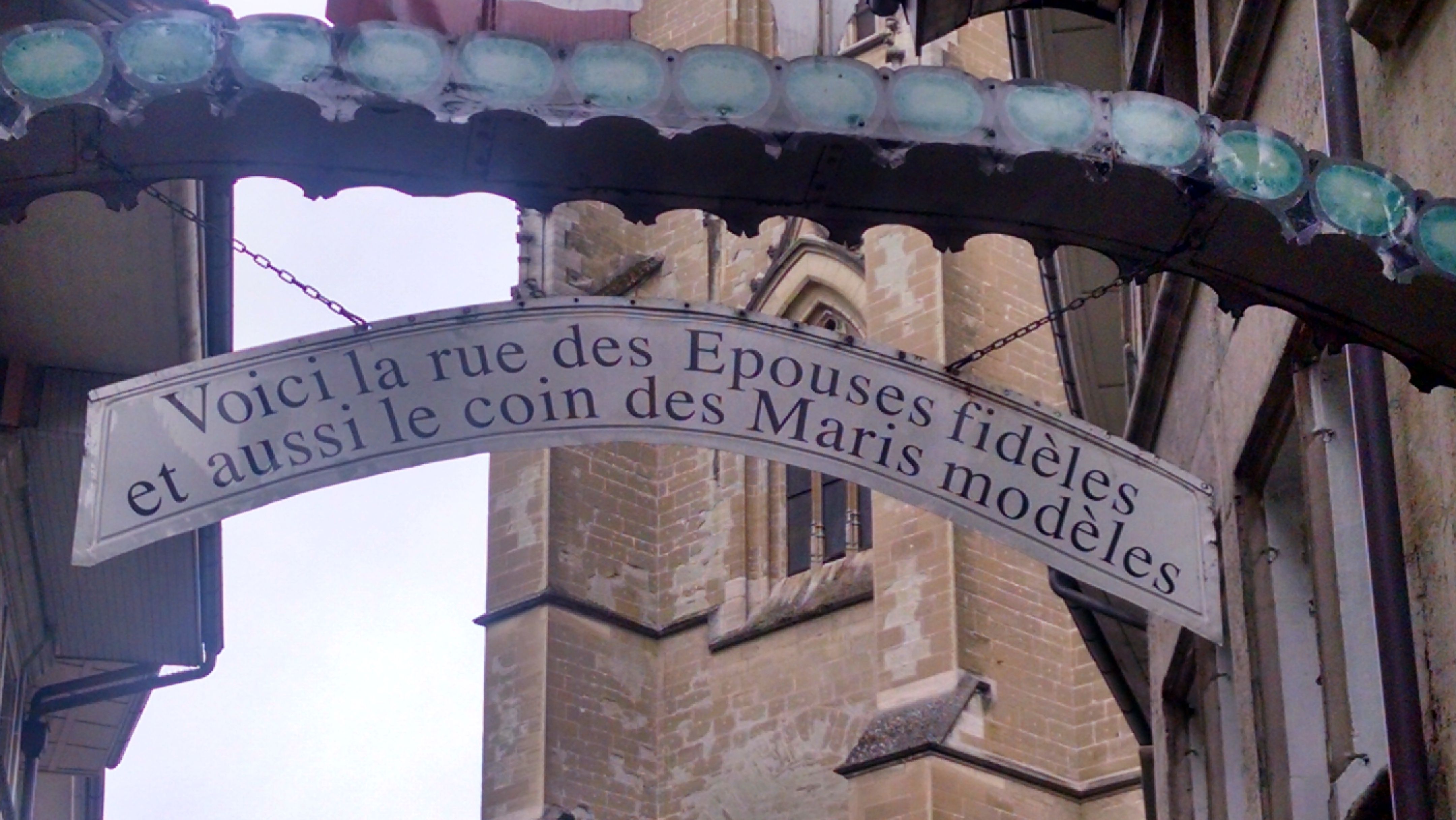 "Voici la rue des Epouses fidèles
"Voici la rue des Epouses fidèles
et aussi le coin des Maris modèles"
It does not give the bridegroom the same warning as the Swiss German version. Rather, it conveys a more hopeful message to those walking under it, and translates to:
Here is the street of faithful wives
and also the corner/place of model husbands
We always enjoy deciphering signs when we travel. In languages that we are less familiar with, this is obviously more of a challenge, as the nuances, double meanings, and humor are much harder to “get.”
Reading and deciphering signs can make a stroll though a city interesting and fun; it can also give you an opportunity to ask a native and practice your speaking...
Bio: Ulrike Rettig is the co-founder of Gamesforlanguage.com. She is a life-long language learner, growing up in Austria, the Netherlands and Canada. You can follow her on Facebook, Twitter and Instagram, and leave any comments with contact.

